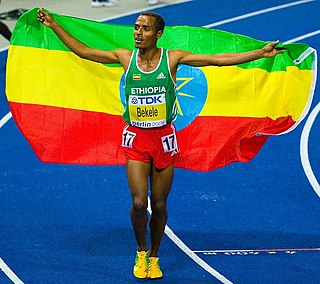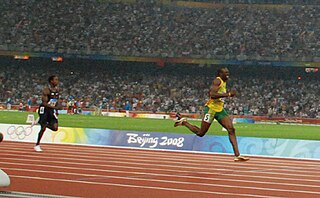Athletics records progressions outline the lineage and improvement of the best ratified marks in a particular athletics event.
Track events
| Field events | Road events |

The first record in the 100 metres for men (athletics) was recognised by the International Amateur Athletics Federation, now known as World Athletics, in 1912.

The first world record in the 100 metres sprint for women was recognised by the Fédération Sportive Féminine Internationale (FSFI) in 1922. The FSFI was absorbed by the International Association of Athletics Federations (IAAF) in 1936. The current record is 10.49 seconds set by Florence Griffith-Joyner in 1988.
The first world record in the women's pole vault was recognised by the International Association of Athletics Federations in 1994. The inaugural record, 4.05 metres by Sun Caiyun of China set in 1992, was the world's best mark as of December 31, 1994.
The first world record in the men's pole vault was recognized by the International Association of Athletics Federations in 1912.

Thomas Schönlebe is a retired East German track and field athlete who competed in the 400 metres. He won the gold medal at the 1987 World Championships. In that race, he set a European record of 44.33 seconds which stood for 35 years before it was broken by Matthew Hudson-Smith in August 2023.

The following tables shows the world record progression in the Men's 3000 metres. The International Amateur Athletics Federation, now known as the International Association of Athletics Federations, ratified its first world record in the event in 1912.
The following table shows the world record progression in the Women's 3,000 metres. The first record officially recognised by the IAAF was set on 6 July 1974 by Lyudmila Bragina from the Soviet Union.
The following table shows the world record progression in the men's and women's 800 metres, officially ratified by the IAAF.

The 1500-metre run became a standard racing distance in Europe in the late 19th century, perhaps as a metric version of the mile, a popular running distance since at least the 1850s in English-speaking countries.

The following table shows the world record progression in the men's 200 metres, as ratified by the IAAF. The current record of 19.19 seconds was set by Usain Bolt at the 2009 World Championships in Athletics.
The first world record in the 400 m for men (athletics) was recognized by the International Amateur Athletics Federation, now known as World Athletics, in 1912. The IAAF ratified Charles Reidpath's 48.2 performance set at that year's Stockholm Olympics as a world record, but it also recognized the superior mark over 440 yards run by Maxie Long in 1900 as a world record.
The first world record in the 4 x 100 metres relay for men (athletics) was recognized by the International Amateur Athletics Federation, now known as World Athletics, in 1912.
The first world record in the 4 x 400 metres for men (athletics) was recognized by the International Amateur Athletics Federation, now known as the International Association of Athletics Federations, in 1912. The IAAF's first record in the event was for a mark set the year before the organization's formation. The men's record has been almost exclusively set by American teams, with one exception by one Jamaican team. To June 21, 2009, the IAAF has ratified 15 world records in the event.
The following table shows the world record progression in the Men's 110 metres hurdles.

The official world records in the 3000 metres steeplechase are held by Lamecha Girma of Ethiopia at 7:52.11 minutes for men and Beatrice Chepkoech of Kenya at 8:44.32 for women.

The official world records in the 10,000 metres are held by Ugandan Joshua Cheptegei with 26:11 minutes for men and Kenyan Beatrice Chebet with 28:54.14 for women.

The 200 metres at the Summer Olympics has been contested since the second edition of the multi-sport event. The men's 200 m has been present on the Olympic athletics programme since 1900 and the women's 200 m has been held continuously since its introduction at the 1948 Games. It is the most prestigious 200 m race at elite level. The competition format typically has three or four qualifying rounds leading to a final race between eight athletes.

The 10,000 metres at the Summer Olympics is the longest track running event held at the multi-sport event. The men's 10,000 m has been present on the Olympic athletics programme since 1912. The women's event was added to the programme over seventy years later, at the 1988 Olympics. It is the most prestigious 10,000 m race at elite level. The competition format is a straight final between around 30 athletes, although prior to 2004 a qualifying round was held.

The 400 metres hurdles at the Summer Olympics is the longest hurdling event held at the multi-sport event. The men's 400 m hurdles has been present on the Olympic athletics programme since 1900, with a sole gap at the 1912 Summer Olympics. The women's event was added to the programme over eighty years later, at the 1984 Olympics. It is the most prestigious 400 m hurdles race at elite level.
The men's long jump world record progression lists records ratified by the International Association of Athletics Federations (IAAF) starting in 1912. The inaugural record was the 7.61 m performance by Peter O'Connor in 1901.